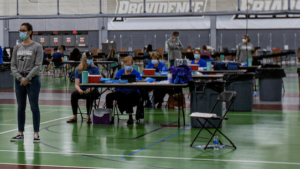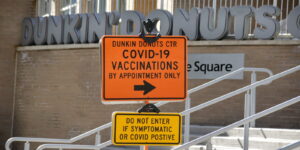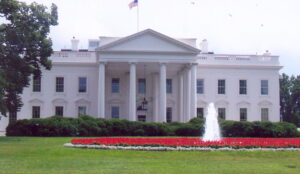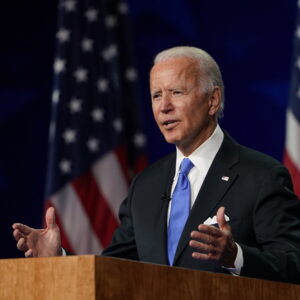Tag: Katherine Morrissey ’22
Vaccinations at Friars’ Fingertips: Moderna Vaccines Arrive on PC Campus
by The Cowl Editor on May 6, 2021
Campus

Katherine Morrissey ’22
News Staff
Almost a week after vaccines became available to all students over the age of 16 in Rhode Island, the Providence College community was once again greeted with positive news regarding COVID-19 vaccinations. In addition to vaccination appointments continuing to be available in Providence at the Dunkin’ Donuts Center, vaccines would soon become accessible like never before for the Friar Family.
The news came through a series of emails sent to students, faculty, and members of the PC community from the Continuity Task Force during the weekend of April 25. These messages communicated that the Rhode Island Department of Health had announced it would offer a COVID-19 vaccination clinic for Providence College students, faculty, and staff at Peterson Recreation Center on Wednesday, April 28.
Students who wished to be vaccinated at the on-campus clinic were required to register in advance through the state’s scheduling portal. Despite the need for registration, the clinic located on campus provided a convenient opportunity to get vaccinated for students, faculty, and staff as Wednesday, April 28 was already a designated rest day.
The clinic operated from 10 a.m. to 6 p.m. in Peterson Recreation Center, offering those who wished to make appointments a large window on their day off to stop by and get vaccinated. The large gym, with the help of many devoted workers, was quickly transformed into a fully functional vaccination clinic. The gym, however, is no stranger to dramatic transformations as it has been the backdrop of many events throughout the years including everything from Black and White Ball to spin classes to, most recently, a COVID-19 testing center.
Those who got vaccinated at the on-campus clinic on April 28 received the Moderna vaccine, which requires a minimum of four weeks between doses. Those who are able to return to campus after the school year is over are encouraged to come back to Peterson on May 26 for their second dose. Individuals who cannot are encouraged to schedule their second doses of Moderna at home for on or around the same date. Those who have received both doses are then required to upload documentation to the College’s website.
After receiving their vaccine, students were given a Dunkin’ gift card and were entered into a raffle for the opportunity to win an Apple Watch. This provided extra incentive for all students to take a little time during their day off to get vaccinated.
The vaccination clinic was not open to all students, such as those who have already received the first dose of vaccines from different manufacturers like Pfizer, or students who were in quarantine or isolation for COVID-19. The clinic did not have significantly negative impacts on the schedules and routine of other students on their day off. The only change the PC community was forced to make was to their twice-a-week testing schedule.
While this change required students to test a day earlier and later than normal during the week, it also afforded them no testing on their day off. This quick and successful change demonstrated the school’s flexibility in executing the clinic as well as maintaining COVID-19 protocols already in place.
Vaccinations for students do not indicate an immediate end to the COVID-19 pandemic which continues to impact all our lives. However, Wednesday’s clinic marked a revolutionary step in the process of getting all members of the school community vaccinated.
Within the last year, many communities and groups of people have struggled to adapt and navigate the COVID-19 pandemic. This was widely seen across many college campuses as school communities had no choice but to be remote in order to keep students and faculty safe. Although many of us have been witnesses to the struggles and hardships of the last year, widespread vaccinations remind us of the triumphs of the human spirit and the many ways in which situations of necessity bring about the most impressive innovations.
Continued information about vaccination availability and registration will be provided to students through Continuity emails. The most up-to-date information is also provided on Providence College’s website and the state health department’s online portal.
Vaccine Rollout Starts Spring-ing Into Action: April Brings Increased COVID Vaccinations for Friars, Rhode Islanders
by The Cowl Editor on April 22, 2021
Campus

by Katherine Morrissey ’22
News Staff
After enduring the COVID-19 pandemic for over a year, the Friar Family and residents of Rhode Island can breathe a sigh of relief with vaccination eligibility expanding in the state of Rhode Island.
The happy news was communicated to Providence College students Thursday evening through a series of emails from the Continuity Task Force. Within the emails, students were told that all students 16 years or older now qualify to be vaccinated in the state of Rhode Island. This marks a monumental step for not only the state, but also the PC community, as all students are now eligible to be vaccinated.
The last year has tested the strength of this community, country, and the human spirit globally. Starting last March, students, faculty, and family watched as every sense of normality was turned on its head. The PC community lamented as classes went completely remote, study abroad programs and graduation were canceled, and everyone frantically grew acquainted with a new normal: a world of social distancing, Zoom classes, masks, weekly testing, and constant fear for others’ wellbeing.
At points over the last year, it seemed vaccination was far out of reach, specifically for students who attend college outside of their home state. However, with this news, students studying in Rhode Island can obtain their vaccines without having to travel home.
Late last week, students who were eligible could register to receive their vaccines on Saturday, April 17, at the Dunkin’ Donuts Center from 9 a.m. to 7 p.m. The College offered transportation services to the Dunk, which made arriving for appointments more convenient.
Walking through the center and entering the stadium for the first time since last March was truly surreal. The familiar basketball court had been transformed into a fully-functioning vaccination clinic. While this new image did not match the memories of March Madness games and the John Legend concert, students found themselves in awe of how far the world has come in just over a year.
Continued information about vaccination registration and access is being communicated to students through emails via the Continuity Task Force. However, the most up-to-date information is also provided on the College’s website and the state health department’s online portal.
Vaccination appointments are given on a first-come, first-served basis. To register for a vaccination appointment, students can call 211, which is staffed from 8 a.m. to 8 p.m., and ask for information about equity-focused vaccination clinics.
Prince Philip, Husband of Queen Elizabeth, Dies at 99
by The Cowl Editor on April 15, 2021
National and Global News

by Katherine Morrissey ’22
News Staff
On Friday, April 9, Prince Philip, Duke of Edinburgh, passed away at the age of 99. The news of his passing came around noon in the form of a statement from Buckingham Palace which stated, “It is with deep sorrow that Her Majesty the Queen announces the death of her beloved husband.”
The duke, at the time of his death Friday morning, was the longest-serving royal spouse in British history. Prince Philip married Elizabeth, the elder daughter of King George VI and heir to British throne, in 1947. Just two years later, Elizabeth ascended to the throne, and Philip has since been by the queen’s side for over six decades. The couple were married for almost 74 years.
Prince Philip served in the Royal Navy during World War II prior to his role as the queen’s consort. During his time in the Navy, the duke was praised for his bravery and heroism. He even received the Greek War Cross, a military decoration for acts of heroism, for his role in the Battle of Cape Matapan. This award, amongst other actions, shows how, despite his royal title, Prince Philip lived a life characterized by putting others before himself.
The duke not only put others before himself in military duty, but also spent much of his life playing a pivotal supporting role for the queen, who has served as the monarch of a powerful nation that has gone through challenging times over the past six decades. In a BBC article concerning his death, a tourist visiting London stated, “He’s been with her for 73 years. If it wasn’t for him, who knows if she would have got through it.” In this sense, the strength and service Prince Philip provided for his wife and the monarchy is truly understood.
Prince Philip was also an active philanthropist. His wife and he supported over 1,000 charities as patrons and members during his long life. Some charities which Prince Philip supported include the British Heart Foundation, the World Wildlife Federation, and Book Aid.
As a veteran, Prince Philip also was engaged in military-related charities, working with organizations like The Association of Royal Navy Officers, The Royal Navy and Royal Marines Equestrian Association, the Army Cadet Force, and the Army Officers’ Boxing Club. He also was very fond of sports and was a patron and member of many prestigious polo and yacht clubs.
While many are saddened to hear of the passing of Prince Philip, it is reported that he spent his final days on his own terms. The duke, who had been suffering from health complications and concerns for the past few years, ultimately retired from public service in 2017. This February, he was admitted and treated for preexisting conditions at two medical facilities in London. He was not discharged until March.
Since being discharged, Prince Philip reportedly spent his final weeks at Windsor Castle. At the end of his life, he spent most of his time awake, sitting in the sun outside with his wife by his side. He died peacefully Friday morning in the comfort of his home with the queen by his side as he wished.
British citizens and millions across the world have joined in mourning the loss of such a prominent figure and social servant. Many world leaders joined in offering their condolences, including President Joe Biden and First Lady Dr. Jill Biden. They remarked, “His legacy will live on, not only through his family, but in all the charitable endeavours he shipped.” This quote showed a shared sentiment from President Biden and the Palace who wished to highlight and remember Prince Philip’s charitable works.
While many wished to honor his long life and tremendous legacy by offering flowers and displays at Buckingham Palace in London, the Palace has asked in the midst of the ongoing COVID-19 pandemic that individuals not attempt to partake in the funeral service. Instead, they asked people to consider donating to a variety of the duke’s charities.
Prince Philip’s death leaves an unsatisfiable void in the hearts of many individuals around the world. Those who have admired the duke and his service may be inspired to implement acts of service and charity into their own lives. While death and the end of a life is saddening, Prince Philip’s passing reminds us to reflect on the magnificence of such a long and influential life, challenging each of us to live honorably and charitably even if on a smaller scale.
Celebrating Women and Feminism for 110 Years: PC Holds Events to Honor International Women’s Day
by The Cowl Editor on March 18, 2021
Campus

by Katherine Morrissey ’22
News Staff
Over the duration of March, the Providence College community has been simultaneously celebrating women’s achievements and raising awareness of women’s and gender issues in light of International Women’s Day.
International Women’s Day takes place annually on March 8. According to the International Women’s Day website, it is a global holiday dedicated to “celebrating the social, economic, cultural, and political achievements of women.” It also marks a call to action for accelerating women’s equality.
International Women’s Day has been celebrated ever since 1911 and has continued to gain support and attention over the years. This year, IWD celebrated its 110-year anniversary.
PC students were quick to become involved with IWD by dedicating a whole week to celebrating the holiday. This was evident through a variety of clubs on campus organizing in-person and virtual events, all of which had to do with the empowerment and celebration of women.
PC Democrats, alongside Student Congress, Campus Ministry, and the Board of Programmers staged events open to all students and faculty. Their goal was to stimulate discussion surrounding the aforementioned topics. One event that was particularly successful was the panel titled “What It’s Like to Be a Woman at PC.”
One notable panelist from the night was Tess Jacobson ’22, an economics major and German minor. On top of her studies, Jacobson is vice-president of Women Will, where she has dedicated time and effort to the feminist cause on and off-campus, as she demonstrated by participating in the panel.
When asked about what motivated her involvement at the College, Jacobson stated, “While I have always been a feminist, I decided to become more involved to better understand what feminism means at PC.” She continued, “I’ve met people at PC who agree and disagree with feminism and heard/seen some events that seemed anti-feminist, so I decided to get involved myself.” Jacobson’s involvement shows how students can be proactive in getting involved and educated about issues they are passionate about on campus. Women’s Week served as an opportunity for both involvement and education.
Regarding the event, Jacobson stated, “I think the event definitely raised awareness about the issues and discrimination women can face on campus. Especially when it comes to hookup culture, sexual harassment, and sexual assault.”
Jacobson’s sentiments show how events like “What It’s Like to Be a Woman at PC” have the potential to provide awareness of and education on even the most challenging subjects. Topics like sexual harassment and sexual assault are sometimes difficult to discuss, especially in front of faculty and other students, but are nevertheless integral in raising awareness and creating solutions for students on campus. These are real and relevant issues, especially considering the correlation between occurrences of harassment or assault and the prevalence of hookup and drinking culture on college campuses.
Concerning the success of the event, Jacobson remained optimistic but truthful, stating, “There was a good number of students and faculty that attended the event, which was encouraging to see. However, the problem with events like these is it seems to always be the same people that attend. While all attendees are always appreciated, without new faces, events can tend to be an echo chamber.”
While events are gaining more student attention, there is always room for more students to attend and get involved, and especially individuals who know less about women’s issues.
Jacobson also commented on what misconceptions or changes she thinks might benefit the PC community to support gender equality. “I think first and foremost it’s helpful to stop the stigma that’s sometimes associated with feminism, that it’s a bad word or only a women’s issue. Feminism on a basic level simply means you believe men and women should be equal.”
While stigmas about feminism and its meaning continue to be problematic, events and campus efforts like those associated with Women’s Week promote further awareness and understanding for students. However, some question if these efforts are enough and if change to the campus climate is needed for long-term solutions.
Jacobson mentioned a potential curriculum change when asked about beneficial changes that could be made. “I think encouraging more students to take WGS [women’s and gender studies], or Black studies courses, or any course that promotes diversity is always helpful.”
Although there are many issues facing students on college campuses in our world today, the efforts made by students like Jacobson during Women’s Week demonstrate the ways in which the College is starting to have the important conversations needed to not only raise awareness, but ultimately to reduce the prevalence of gender-related issues on campus going forward.
Welcome, Folks, to the Biden Administration: A Closer Look at the First 100 Days in Office
by The Cowl Editor on February 11, 2021
National and Global News

Photo courtesy of pixnio.com.
by Katherine Morrissey ’22
News Staff
Joseph Biden, Jr., ran a successful campaign grounded on a platform that aligned itself with the Democratic Party’s core beliefs, ultimately resulting in his inauguration as the 46th president of the United States.
The significance of an administration’s first 100 days in office dates back to the incredible feats accomplished by President Franklin D. Roosevelt at the start of his presidency in 1933. In the wake of the Great Depression, Roosevelt inherited a country in economic tatters with nearly a quarter of the nation unemployed following the stock market crash of late 1929. However, Roosevelt did not let the circumstances delay implementing his progressive agenda to help combat the economic and social effects of the Great Depression through the passage of 15 bills.
After being sworn in on Jan. 20, President Biden inherited a United States in a period of distress, much like President Roosevelt did in 1933. However, many would argue that President Biden has perhaps inherited circumstances that are far more unprecedented.
Within the last year, according to the New York Times, over 400,000 Americans have lost their lives during the nation’s struggle to combat the COVID-19 pandemic. Additionally, the pandemic has had detrimental effects on the country’s economic performance.
According to the Bureau of Economic Analysis, the United States experienced two consecutive quarters of decline in gross domestic product, indicative of a recession. Furthermore, it recorded a decrease of 9.1 percent in the second quarter of 2020. This marked the country’s starkest quarterly drop of economic output in recorded history—quarterly GDP has been recorded since 1947 and has never exceeded a drop of more than three percent throughout various recessions.
Given that the nation is faced with such dire circumstances as a result of the ongoing pandemic, a large part of President Biden’s agenda for the beginning of his administration involves taking swift action to combat the ongoing public health and economic crises. While President Biden has made significant promises to combat COVID-19, he also plans to make good on other pledges he made during his campaign regarding other key issues. For example, he has promised to send a bill to Congress which would be for “legislative immigration reform that will modernize our immigration system and give nearly 11 million undocumented immigrants a roadmap to citizenship.”
In regard to the climate and environmental concerns of the country, President Biden promised to sign two executive orders. The first will create a plan to reach a one hundred percent clean energy economy and net-zero emissions by 2050. The next would look “to conserve 30% of America’s lands and waters by 2030.”
On the note of civil rights, President Biden promised to repeal the Trump-era military ban on transgender individuals and restore the protections and provisions of the Obama administration concerning transgender rights.
Additionally, President Biden signed executive orders that included rejoining the Paris Climate Agreement, launching a “100 day mask challenge,” extending student loan pause, launching a Whole-of-Government Initiative to Advance Racial Equity, halting construction of the southern border wall, restoring protection of DREAMers, reversing the Muslim ban, and ensuring worker protections by mandating that employees follow CDC guidelines.
While many frequently criticize Biden for his centrist or moderate beliefs amongst his Democratic constituents, these actions taken on his first day in office actually demonstrate his commitment to following through on a progressive agenda, regardless of the tumultuous times our country is enduring.
Going forward, Americans can expect the Biden Administration to continue to be aggressive in attempting to implement the policies they promised on the campaign trail, as well as in reversing Trump-era policies.
The administration is currently working with Congress to reach a compromise to provide greater economic relief to citizens through another round of stimulus checks.
Although the circumstances are different, the legacy of President Roosevelt’s first 100 days in the Oval Office seems to be shaping the Biden Administration’s approach to office as Biden optimistically attempts to steer the United States out of a historically challenging period and into one of hope and prosperity.
The Painful Transition of Power: Mixed Emotions as New Presidential Administration Takes Office
by The Cowl Editor on February 4, 2021
National and Global News

by Katherine Morrissey ’22
News Staff
On Jan. 20, at 12 p.m., Joseph R. Biden, Jr. was sworn in as the 46th President of the United States. While his inauguration marked the end of President Donald Trump’s four-year term and an unprecedented election cycle, it also came at the end of a historic month of strife and terror.
As legislators joined to officially count and certify electoral votes, a large crowd gathered nearby for what would become one of President Trump’s most memorable rallies. However, what followed on this date would shock the nation to its core.
Around 1 p.m., Americans watched as rioters from the protests began to attack Capitol police as they attempted to enter the Capitol building. Their motive: to delay and stop the certification of the election. Due to concerns about the violent nature of the event, legislators were ordered to shelter and eventually evacuate.
By 2 p.m., the rioters had breached the Capitol by scaling walls, breaking windows, and passing through security with violent force. An hour later, they reached the House Chamber armed with zip ties and cell phones to record their actions. Many videos and photos that rioters took on the Senate floor eventually began circulating the internet and news channels, with some images depicting disturbing symbols of white supremacy.
The Capitol was not secured until after 5 p.m. Following the attack, about 1,100 National Guard troops were mobilized. Congress was able to reconvene by the late evening and eventually certify the remaining electoral votes, but not before five individuals lost their lives in the assault.
Three police officers died in the days immediately following the Capitol riot: Brian Sicknick, who died of injuries sustained during the incident, and Howard Liebengood and Jeffrey Smith, who took their lives after defending the Capitol building on Jan. 6. Their deaths highlight a stark contrast between the attack on Capitol police and the Republican Party, which prided itself on “backing the blue” and supporting law enforcement.
During and following the events at the Capitol, many criticized President Trump’s language and overall delay in response, claiming he did not condemn the actions of those involved, and in some situations, seemed to incite or support it.
During the rally, President Trump continued to assert the false notion that the election results were invalid, stating, “We won this election, and we won it by a landslide.” He continued, “We will stop the steal,” in reference to the election. He also stated, “If you don’t fight like hell, you’re not going to have a country anymore,” which some have considered to be the inflammatory spark that ignited a day of unrest and destruction.
After months of spreading misinformation through social media and then his failure to explicitly condemn the attack, President Trump’s personal Twitter account was permanently deleted by the company.
The attack seemed to come as a continuation of the Trump administration’s refusal to partake in the peaceful transition of power and ultimately accept the results of the 2020 election. President Biden spoke of pain prior to his inauguration in a speech given at a COVID-19 memorial at the reflecting pool in Washington, D.C. He stated, “To heal, we must remember. It’s hard sometimes to remember. But that’s how we heal. It’s important to do that as a nation.”
Many across the nation can resonate with the statement. The inauguration and a new administration will not erase the pain of the tumultuous times felt by the nation, rather, it will continue to remember this pain in order to successfully move forward.
Despite President Trump’s refusal to concede, the violent threats against democracy, and the chaos of a pandemic, the country moved forward on Jan. 20, with the inauguration of Joseph R. Biden as President of the United States.
President Biden, at 78, is now the oldest president to be inaugurated into office. He also serves as the second Catholic president in office, decades after President John F. Kennedy. Kamala Harris became the first female, Black, and South Asian American vice president, demonstrating what a significant and historic moment this day was for the country.
Biden stated in his inaugural address, “This is America’s day. This is democracy’s day. A day of history and hope, of renewal and resolve. Through a crucible for the ages, America has been tested anew. America has risen to the challenge.”
Following a year of unprecedented turmoil, the United States now has the chance to reaffirm its commitments to democratic ideals and to move forward to overcome the challenging nature of these times.
